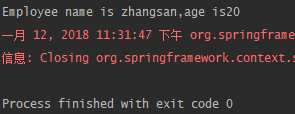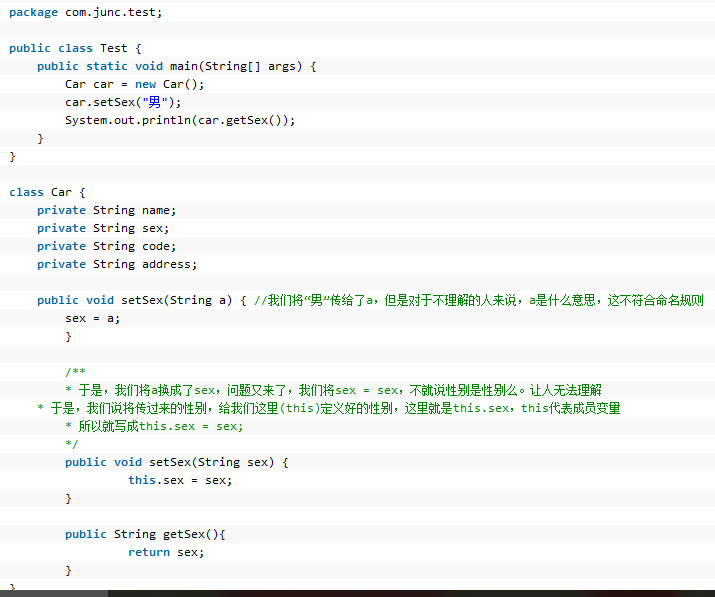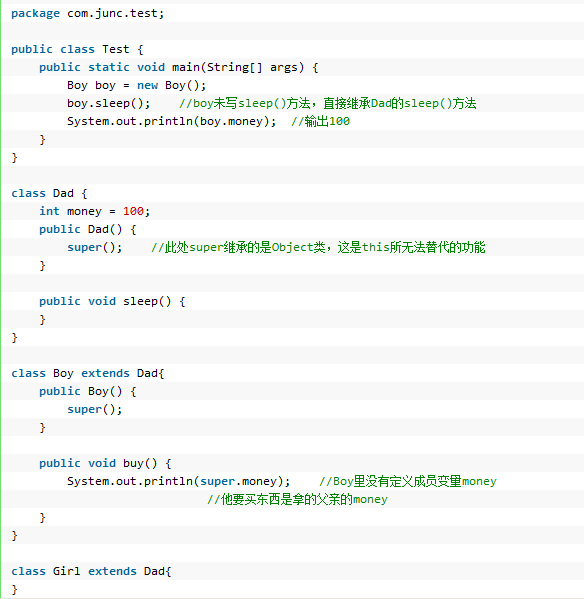发表于: 2018-01-12 23:37:55
1 641
完成
1.使用junit 对spring进行单元测试(参考https://my.oschina.net/dlpinghailinfeng/blog/336694)
实现代码如下
pom.xml
<?xml version="1.0" encoding="UTF-8"?>
<project xmlns="http://maven.apache.org/POM/4.0.0"
xmlns:xsi="http://www.w3.org/2001/XMLSchema-instance"
xsi:schemaLocation="http://maven.apache.org/POM/4.0.0 http://maven.apache.org/xsd/maven-4.0.0.xsd">
<modelVersion>4.0.0</modelVersion>
<groupId>com.ptteng</groupId>
<artifactId>SpringJunitDemo</artifactId>
<version>1.0-SNAPSHOT</version>
<properties>
<project.build.sourceEncoding>UTF-8</project.build.sourceEncoding>
</properties>
<dependencies>
<dependency>
<groupId>junit</groupId>
<artifactId>junit</artifactId>
<version>4.11</version>
<scope>test</scope>
</dependency>
<dependency>
<groupId>org.mockito</groupId>
<artifactId>mockito-core</artifactId>
<version>1.9.5</version>
<scope>test</scope>
</dependency>
<dependency>
<groupId>org.springframework</groupId>
<artifactId>spring-test</artifactId>
<version>3.2.3.RELEASE</version>
<scope>test</scope>
</dependency>
<dependency>
<groupId>org.springframework</groupId>
<artifactId>spring-context</artifactId>
<version>3.2.3.RELEASE</version>
</dependency>
</dependencies>
<build>
<plugins>
<plugin>
<groupId>org.apache.maven.plugins</groupId>
<artifactId>maven-surefire-plugin</artifactId>
<version>2.5</version>
<configuration>
<skipTests>true</skipTests>
</configuration>
</plugin>
</plugins>
</build>
</project>
ApplicationContext.xml
<?xml version="1.0" encoding="UTF-8"?>
<beans xmlns="http://www.springframework.org/schema/beans"
xmlns:xsi="http://www.w3.org/2001/XMLSchema-instance"
xmlns:context="http://www.springframework.org/schema/context"
xsi:schemaLocation="http://www.springframework.org/schema/beans http://www.springframework.org/schema/beans/spring-beans.xsd
http://www.springframework.org/schema/context http://www.springframework.org/schema/context/spring-context-3.2.xsd">
<!-- 声明employee对象,交给spring创建
constructor-arg:通过构造函数注入。
property:通过setter对应的方法注入。 -->
<bean id="employee" name="employee" class="Employee" autowire="default">
<constructor-arg name="age" value="20"></constructor-arg>
<constructor-arg name="name" value="zhangsan"></constructor-arg>
</bean>
</beans>
Employee.java
public class Employee {
private Integer age;
private String name;
public Integer getAge() {
return age;
}
public void setAge(Integer age) {
this.age = age;
}
public String getName() {
return name;
}
public void setName(String name) {
this.name = name;
}
public Employee(Integer age, String name) {
this.age = age;
this.name = name;
}
@Override
public String toString() {
return "Employee name is " + name + ",age is" + age;
}
}
测试类
import static org.junit.Assert.assertEquals;
import org.junit.Test;
import org.junit.runner.RunWith;
import org.springframework.beans.factory.annotation.Autowired;
import org.springframework.context.ApplicationContext;
import org.springframework.test.context.ContextConfiguration;
import org.springframework.test.context.junit4.SpringJUnit4ClassRunner;
@RunWith(SpringJUnit4ClassRunner.class)//使用junit4进行测试
@ContextConfiguration(locations = {"classpath:ApplicationContext.xml"})////加载配置文件
public class EmployeeTest {
@Autowired
ApplicationContext ctx;
@Test
public void testEmployee(){
Employee employee = (Employee) ctx.getBean("employee");
//assertEquals("zhangsan",employee.getName());
System.out.println(employee);
}
}
结果

其中
Junit常用的声明方法API为Assert 类
方法 void assertEquals(boolean expected, boolean actual) 是检查两个变量或者等式是否平衡

其返回值为空,不注释掉的话也能测试通过,为了有个可视的结果,加了一句

2.学习java语法(以下内容摘自http://blog.csdn.net/w83325887/article/category/6344852)
为什么封装?
婴儿太多,所以我们会考虑将每个出生的婴儿的文档我们都会放于一个盒子里,这样方便以后我们查询他的身份证信息。于是在这个盒子上,我们打了一个孔,叫setXXX()方法,如果是身份证,我们就取名setCode()方法,这样就将一个人的身份证信息建立set了。但放进去后,我们有时候还需要检验这个人的身份证信息,所以我们又打了一个孔,叫getXXX()方法,对应于setXXX()方法。
对了,每个人的姓名和身份证号都是独一无二的,为了防止别人随意的修改这些信息,我们将这些信息标记为私人的,也就是私有的,英文表示就是private。 所以我们会表示为private String code;而仅仅是String code;
这样我们就把这些信息装入了一个盒子里,并保证了他的安全性。
封装原则
* 将不需要对外提供的内容都隐藏起来。private
* 把属性隐藏,提供公共方法对其访问。setXXX(), getXXX();
为什么会有this呢?

为什么会有继承?
继承,顾名思义就是孩子继承父母的东西。
比如说老爸Dad()会sleep()。他有两个孩子Boy(),Girl()。
孩子也会睡觉,那我得在两个孩子里分别单独写sleep()方法,这也挺麻烦的。
还好只是两个孩子,要是有多个孩子,7个或8个怎么办,难道每个都要说会睡觉么,这样是不是显得废话特别多。
所以我们使用继承关系,只要老爸写一个,大家都可以用。
同时,我们人类都有一个祖先。
所以类也有一个祖先,叫Object类,Object可译为“客观的”
继承,用英语表示extends,也有扩展的意思。
所以说,继承的好处就是为了减少代码的重复率,也可以归纳为程序员的懒~~~
有好处当然也坏处,正如妈妈说的:不能随随便便拿不相关人的东西。
只有确认需要继承父类的东西,才能继承,可不能随便认爹。
为什么会有super?
因为super可以调用父类的成员变量。
当然this也可以调用父类的成员变量,还可以访问自己的成员变量。
然而,super还有一个隐藏功能,就是:如果没有默认的构造函数,就必须用super显式地编写调用构造函数的语句。这是this所无法完成的功能。

问题
没什么新问题
收获
老大今天谈话,说来修真院要注重团队协作,自学能力,解决问题的能力的训练。
认真对待小课堂,写写博客,有时间看看洗骨换髓基础知识,在任务过程中把Java语法补回来。
计划
1.学习SpringAOP
2.学习spring+mybatis操作数据库





评论